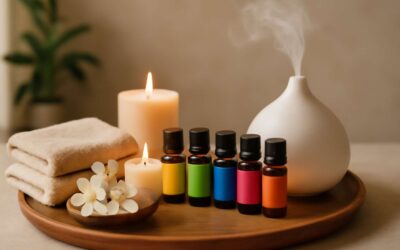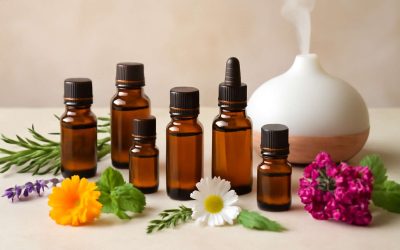
Whether you use them to treat skin blemishes, help you sleep better or aid in a healthy lifestyle, essential oils have become an integral part of our daily lives. These concentrated plant extracts have received a lot of buzz recently thanks to claims that they can help alleviate everything from stress and headaches to insomnia and achy joints. While research is limited, it’s clear that these powerful natural substances have some real benefits—but how do you incorporate them into your everyday routine?
Unlike perfumes, which are derived from the flower or bark of a plant, essential oils are extracted directly from the plant. The process is called distillation, which involves passing water or steam through a plant to extract its scent and other chemicals. These liquid extracts are then diluted with a carrier oil or other base material to make them safe for inhalation or direct application to the skin (although they should never be ingested). There are two types of essential oils: pure and therapeutic grade. Pure essential oils contain nothing but the concentrated essence of a plant, which is why they’re typically more expensive than diluted products.
But there are other factors to consider when choosing which brand of oil to buy. A good quality oil should be sourced from a reputable company that works closely with growers and distillers to ensure sustainability, quality and purity. For example, the leading essential oils company doTERRA has a rigorous testing process for its products to ensure that each oil is free of potentially harmful chemical compounds.
The other major factor to consider is how you plan on using the oil, as the method of application can have a big impact on its effectiveness. Diffusion is the most popular way to use essential oils, with people putting a few drops in a diffuser, and then breathing in the mist to enjoy its scent. Others are more hands-on, rubbing the oil onto the skin for topical applications such as spot treatments, massages and achy joints and muscles.
When it comes to using essential oils on the skin, experts recommend diluting them first with a carrier oil such as almond or jojoba. This is important because it prevents the potentially irritating compounds from coming into contact with your sensitive mucous membranes such as your nose, eyes and ears. Moreover, you want to be careful not to apply any essential oil over large areas of the body such as the chest or abdomen because it may cause a burning sensation.
There’s also a growing trend for adding essential oils to bath water, which can have a calming effect on both the mind and body. If you’re thinking about doing this, remember that it’s important to do your research beforehand as some oils can be fatal if ingested and could lead to internal bleeding if rubbed into the eyes or mucous membranes. Lastly, always store your essential oils out of reach from children and pets.


0 Comments